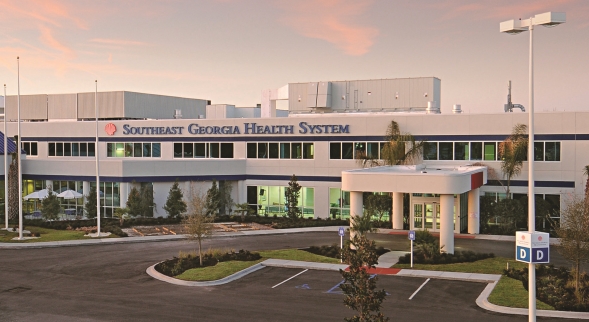Tens of millions of dollars in government funding for Georgia health care faces a dangerous deadline in less than two weeks.

And while experts believe that much of the funding, if not all, will be renewed by Oct. 1 or afterward, there are no guarantees, with a fractious Washington dealing with the bitter aftermath of votes to repeal the Affordable Care Act.
The money at risk includes funding for a popular children’s health insurance; Medicaid funds for hospitals that deliver a high level of indigent care; and financial support for community health centers.
And there’s about $10 million at risk for rural hospitals in Georgia that have a low number of Medicare patients.
Perhaps the most visible of the four programs is the Children’s Health Insurance Program (CHIP), known as PeachCare in Georgia. It covers about 130,000 Georgia children whose parents’ incomes are too high to qualify for Medicaid. Nationwide, about 9 million kids are covered by CHIP.

The program has support on both sides of the aisle, and the Senate Finance Committee agreed this month to a five-year funding extension for it.
“Congress needs to act quickly to extend the funding for CHIP,” said Sen. Orrin Hatch, a Republican from Utah.
Politico reported that for months, the Obamacare repeal debate sidelined work on extending federal funding for CHIP. States have repeatedly warned lawmakers that they may have to freeze enrollment or send termination notices to enrollees if funding is not renewed by the end of this month.
Georgia, though, has enough CHIP funding to last into 2018, even if Congress does not act to extend funds by Oct. 1, industry officials say.
Lifeline hospitals face cuts
Another big chunk of money involves Medicaid “disproportionate share’’ (DSH) funding being cut by $43 billion between fiscal 2018 and fiscal 2025. Under the ACA, these cuts for facilities serving a large number of Medicaid and uninsured patients were supposed to be offset by expanded health coverage and the creation of more paying patients. But for many reasons, that has not always worked out as envisioned, especially in states, such as Georgia, that have not expanded their Medicaid programs under the ACA.

The most recent extension of DSH funding expires Sept. 30.
Georgia hospitals are confronting a $36 million DSH reduction the first year. Of that total, Grady Memorial Hospital, Atlanta’s safety-net hub, would lose $11 million to $13 million in 2018.
That would be a “major hit to Grady’s bottom line,’’ said Grady CEO John Haupert in a statement Monday.
“By 2024, we expect the total DSH funding reduction to Grady will be about $52 million annually,” Haupert said. “Georgia stands to lose nearly $200 million by then.
The 2018 DSH cuts are scheduled to take effect Oct. 1 of this year, but Congress may have time to rethink the cuts before the Department of Health and Human Services begins implementing them, Haupert said.
Rural hospitals, already financially strapped, would also be hit hard. “DSH is extremely important to these hospitals,’’ said Jimmy Lewis, CEO of HomeTown Health, an association of rural hospitals in the state. “That’s money right off the bottom line.’’
Impact on health centers
Financing for community health centers also has an end-of-the-month deadline.

If Congress doesn’t act before Sept. 30, community health centers nationwide risk losing up to 70 percent of their federal money.
That’s about $84 million for Georgia, spread out over 34 health centers.
These federally qualified health centers cover 109 counties and serve 600,000 Georgians, according to the Georgia Association for Primary Health Care.
“The vast majority are either uninsured or on Medicaid, which represents a group that would otherwise receive no care or have great difficulty finding a provider,’’ said Duane Kavka, executive director of the organization.
Without these services, “most of these people would end up in hospital emergency rooms,’’ he said Monday. “This is already a problem for the hospitals, and we did not want to add to that problem.”
It’s ‘make or break’
Under the radar among the imperiled funding streams involves another potential financial setback to rural hospitals.
The “low-volume adjustment’’ money from Medicare helps rural hospitals that are at least 15 miles from a similar hospital and have fewer than 1,600 Medicare discharges annually. (“Critical access’’ hospitals are exempt from this money.)

According to accounting firm Draffin & Tucker, the 2016 payments ranged from $19,000 for Piedmont Mountainside Hospital in Jasper to $1 million for Southeast Georgia Health System’s Camden campus.
“These hospitals are struggling,’’ said Jeff Askey of Draffin & Tucker. “Even a little money could make or break a hospital. It’s going to be tough to handle it.”
Lewis said the potential Georgia reduction of $10 million averages about $400,000 per facility.
“This is a catastrophic cut,’’ he said. “This money is dedicated for hospitals to continue to provide care to these Medicaid patients.’’
If the funding goes away, Lewis said, counties may have to fill the gap with local taxpayer money.
COMING SOON on GHN: ‘Ground zero’ for three hospitals in Georgia

